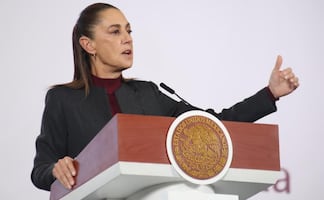Más Información

Sheinbaum aclara incidente con la familia Aguilar; dice que no fue un ataque directo sino un operativo en Zacatecas
"Estás viendo tormenta, hijito, y no te hincas"; Ricardo Monreal le pide a su hermano Saúl desistir de la gubernatura de Zacatecas

"La instrucción es que no salga de la cárcel": Javier Duarte; acusa "tintes políticos" en su nuevo proceso penal

Vinculan a proceso a Dionicio Emanuel Álvarez, excolaborador de Cuauhtémoc Blanco; también lo investigan por fraude
Demonstrators in northern Mexico have burned several government vehicles, blocked railway tracks, and set afire a government office and highway tollbooths to protest water payments to the United States.
Mexico has fallen behind in the amount of water it must send north from its dams under a 1944 treaty, but farmers in the northern state of Chihuahua want the water for their own crops.
President Andrés Manuel López Obrador said Thursday that the protests were being fanned by opposition politicians who belonged to the National Action Party (PAN) for their own motives. He said there was enough water to comply with the treaty and support local crops.
“Some people are taking advantage now for their own benefit ... opposition politicians, in this case,” López Obrador said.
Recommended:
The president criticized “the attitude of confrontation” and the burning of federal property, and promised “the farmers , the inhabitants will not lack water.” And he noted that further west along the border — notably in the Colorado River basin — Mexico receives four times more water from the United States than it gives under the treaty.
At the National Palace, López Obrador said that if farmers and inhabitants in Chihuahua would be left without water “then we would not be able to comply with the treaty; we would apply President Benito Juárez’s principle that no one is obliged to the impossible, but that is not the case.
“There will be enough water for farmers, citizens, and I’m urging them not to be manipulated by those who want to benefit from the situation.”
Moreover, AMLO said his administration is monitoring water management in Chihuahua because there is information pointing to theft at its delivery.
“When the treaty was signed, it was mentioned that Mexico was benefitted and it is still considered a fair treaty for our country. If we do not pay the water, it can be said we are not complying with the treaty and it can be renegotiated and Mexican technicians believe it would not be good to us. The only possibility for there to be a renegotiation by the U.S. is that we do not comply with what is established, that is why we are making the water payments ,” he said.

The protests appeared to be centered in the town of Delicias, Chihuahua, near one of the dams where water is being released to flow northward. Federal forces guarding the dam gates have clashed with protesters in recent weeks.
Photos from Delicias showed that demonstrators used heavy equipment to drag pickup trucks belonging to the national water commission to nearby train tracks where they were flipped over and set afire. Someone, apparently demonstrators, also set fire to a building where the commission has its offices, and flames ravaged a series of toll booths on a nearby highway.
Under the 1944 treaty, Mexico owes the United States about 500 million cubic meters this year that must be paid by October 24. Payment is made by releasing water from dams in Mexico . Mexico has fallen badly behind in payments from previous years and now has to quickly catch up on water transfers.
The expansion of water-hungry crops has meant that Mexico has used 71% of the northward-flowing Conchos River, while under the treaty it should use only 62% of the water, letting the rest of it flow into the Rio Bravo, also known as the Rio Grande, on the border.
In the past, Mexico has delayed payments, hoping that periodic tropical storms from the Gulf would create occasional windfalls of water. But while Hanna made landfall in Texas earlier this month, the storm’s rains did not reach far enough inland to fill dams in Chihuahua.
The water commission noted ruefully that, “Even though Tropical Storm Hanna recently reached the northeast of the country, the international dams (those involved in the treaty) did not recover the desired volume, as the increased flow occurred downstream.”
The issue has resulted in clashes before.
In March, protesters burned pickup trucks, blocked roads, and demonstrated at the La Boquilla dam, also in Chihuahua.
Earlier this year, López Obrador said there was enough water both for local farmers and payments to the United States .
“We do not want an international conflict,” the president said. “Treaties have to be lived up to. If we have signed a treaty, we have to comply with it.”
mp
Noticias según tus intereses
[Publicidad]
[Publicidad]










